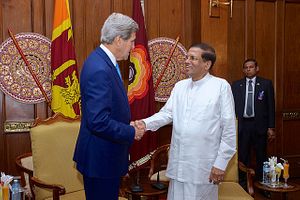The U.S. Congressional Caucus on Ethnic and Religious Freedom in Sri Lanka convened on Capitol Hill on September 17. This is a big month for the island nation and with the 30th session of the UN Human Rights Council (HRC) underway, the timing of this event could hardly be more auspicious.
The event featured a portion of a documentary film titled Sri Lanka: The Search for Justice and two panelists: Miriam Young (executive director at the U.S. Counsel on Sri Lanka) and John Sifton (Asia Advocacy Director at Human Rights Watch [HRW]).
(Disclosure: I currently work at the U.S. Counsel on Sri Lanka on a part-time basis.)
Young spoke broadly about a range of issues facing post-war Sri Lanka today, including: the recent release of the Office of the High Commissioner for Human Rights (OHCHR) report focused on wartime abuses; the significance and key findings of that report; moving forward towards justice and accountability; and breaking the cycle of impunity in Sri Lanka. “The whole security apparatus has not been changed,” she commented.
Regarding the next steps for Sri Lanka, Young noted that “there’s no question that implementing a credible process of accountability is going to be a huge challenge.” She also emphasized the need for dialogue within Sri Lanka in order “to understand what happened during the war.”
Towards the end of her remarks, Young underscored the fact that neither Tamils nor Muslims have faith in a domestic accountability process and that such a process needs to be victim-centered: “They really need to be at the center of any process.” In terms of U.S. foreign policy, she mentioned that Washington “has worked to get this far regarding the search for justice in Sri Lanka” and “the U.S. needs to stay very, very closely engaged.”
Sifton opened his remarks by speaking briefly about the procedural situation at the Geneva-based HRC. He spoke specifically about the possibility of getting a consensus resolution through the HRC, stressed the importance of having clear, firm language in the forthcoming resolution on Sri Lanka and also spoke about the ways in which a domestic accountability process in Sri Lanka would fail. A principal concern would be that Sri Lankans involved in the process could be intimidated (or worse) by others who are not interested in a genuine accountability process. “This is not some academic fear,” he said.
Sifton later spoke about criminal law and, importantly, pointed out that Sri Lanka doesn’t have existing legislation that criminalizes war crimes. Consequently, Sri Lanka’s parliament would need to pass laws in order to criminalize such actions. He cited disappearances and the shelling of civilians specifically. In terms of recommendations related to Capitol Hill, Sifton stressed the importance of the U.S. Congress encouraging the Obama administration to pass a strong resolution on Sri Lanka during the HRC’s 30th session.
If Sri Lanka is to move towards a genuine accountability process, the international community in general and the U.S. in particular can play a vital role – and not just the executive branch. For 90 minutes on a Thursday afternoon in Washington, D.C., it was encouraging to see congressional actors give Sri Lanka’s complex political situation the attention that it deserves.
































